#'the reread value is really good' hits different with context....
Explore tagged Tumblr posts
Text
i managed to get two irl friends into s-class heroine and they both loved it very much ❤️ unfortunately i can't talk to them about [spoiler] so we can only talk about all the cute happy stuff and not the GWAAARRGRHRGRHRHRGRHGRJRHRJEHWHAJXDKFKEOSNDNDWAAAAAHHH parts
#vnikat idk how u do it#like this story feels so different once you hit [spoiler]#you reread everything and go NOOOOOOO#also its so funny when they say 'i reread the story bc it's so funny and pretty' and im like 'yeah the reread value is so good!'#like theyre very correct and its why i reread season 1 four times before i read the webnovel#but#'the reread value is really good' hits different with context....
3 notes
·
View notes
Note
Kim dokja for the ask meme /o/
i got this request 3 times.
favourite thing about them
I can't choose this man has so many layers. The SLAVISH devotion to the concept he cannot be the focus of someone's experience of living really up there, as well as how he is so fucking cringe. Man most deserving of being the protagonist of a tropey webnovel
least favourite thing about him
I think repeated exposure makes even his worst traits endearing. I hHAAAAATTEDDDD him when the novel started but now when I read it i feel so much love.
The qipao and garterbelt thing though
BrOTP
Help. Jung Huiwon I think. She has sooooo much fun being his asskicking right hand she thinks its so funny and awesome. even though she doesnt respect him
and of course han suyeong the way they absolutely ricochet off each other yet are in perfect agreement driving around in an expensive car racking up the $$$ was my favourite moment with them
OTP
dokhyeok -_- juhankim starts picking up later but im missing a lot of context feels so bad...
nOTP
yu sangah. listen he has really fascinating relationships and ways of engaging with people but i would have quit the novel if they went with a choice so painfully straight man pandering
Random Headcanon
In a 'celebrity AU' kim dokja would be a vtuber using vrroid studio default presets with 5 followers who doesn't speak but he's insanely good at the game he plays. sometime he does speedruns on old games no one cares about and constantly hits just shy of world records with his shitty preset vrroid studio model with motion capture from his old android phone.
sorry that isnt a headcanon its just so important that you know this about him. stop making him an idol like in your terrible yaois
Unpopular Opinion
Speaking of idol AUs i think he is done SOOOOOO dirty from cumbrain yaoi fans that came from other webnovel fandoms and it's overtaken it in ways it didn't with MXTX novels despite not being BL which is HEADACHE INDUCING the need to take KIM DOKJA AT FACE VALUE? KIM DOKJA??!???? jail for 1000 years for anyone who comes out of ORV believing the things kim dokja says about himself. like listen kim dokja himself is the kind of person who takes the things he reads at face value it's a part of why he develops such a complex relationship with his rereads he is not a guy that is invested in motivations i shouldn't love him but hate the fandom in a novel innately about the reader and the process of different ways of interpreting a text but holy shit. trying to find what yaoi archetype he fits into is the most darksided way of viewing a text literally i understand how hunger games book fans feel when i see this like leave katniss alone!!!!!!! but its for a slimy webnovel power fantasy protagonist.
favourite picture
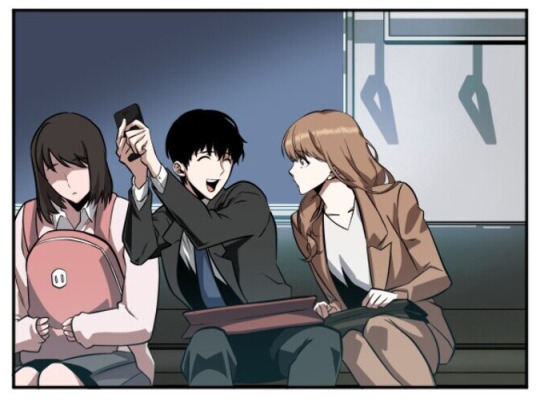
funniest guy in the world
71 notes
·
View notes
Text
The Voyage So Far: Punk Hazard
east blue (1 | 2) || alabasta (1 | 2) || skypiea || water 7 || enies lobby || thriller bark || paramount war (1 | 2) || fishman island || punk hazard || dressrosa (1 | 2) || whole cake island || wano (1 | 2)


nami i love you
i reread nami’s backstory for the east blue post shortly before sitting down to write this one up, and it made her insistence on helping the punk hazard children hit a little different for me. they’re victimized and exploited kids, just like she was.
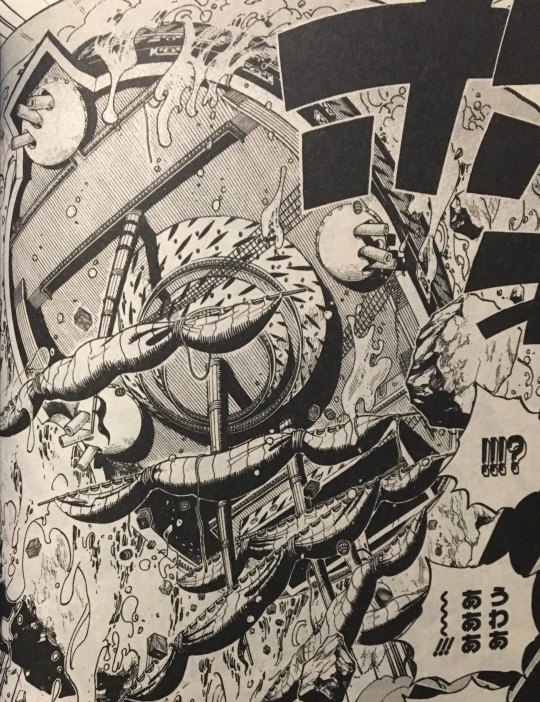
law’s devil fruit is genuinely one of my favorites, as well as, in my opinion, one of the visually coolest by far, and i love all the cool displays of it we get both in this arc and the next one


i know law gets clowned on a lot this arc, and that’s fantastic too, but he also has a lot of genuinely cool panels, especially early on
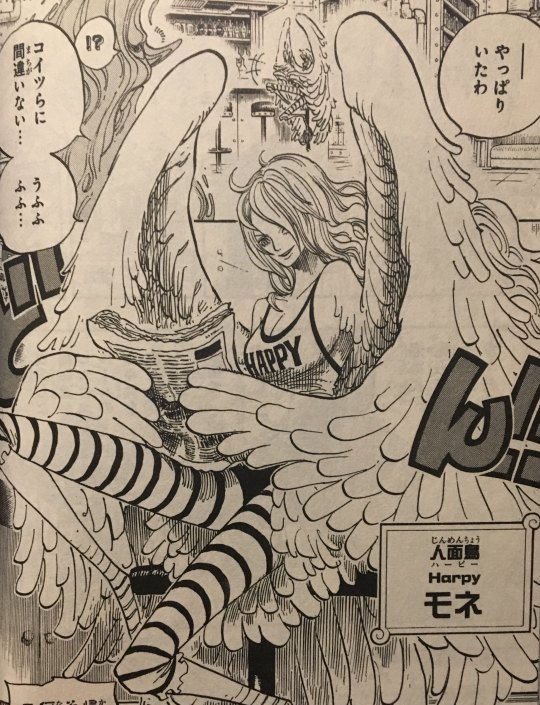
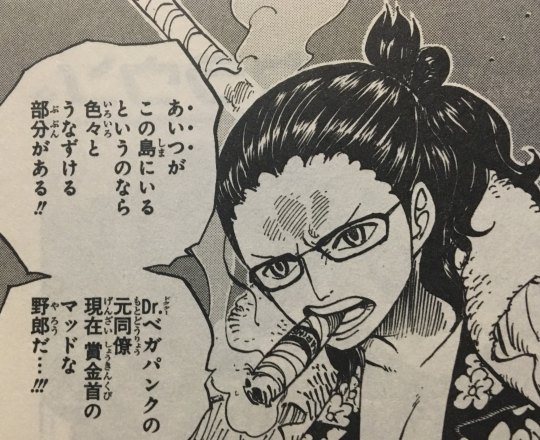
characters that remind me how gay i am
relatedly, i do think monet has one of the best visual designs introduced in the new world, especially for a character who, ultimately, is a minor antagonist. i’m not just saying that because she’s hot, either- her wings and talons flow so well with the rest of her design while giving her a monstery look that will later come out FULL force when she turns into a full-on snow monster.

law saying he’s free to go wherever he wants, and his chopping up anyone who even dares to question that right, hits a lot harder knowing his backstory and cora’s final words and thoughts

alliance time!! this was eight and a half years ago in real time, and these two are still working together. i kind of like thinking about this from law’s point of view, because he allied with the strawhats solely to have a few more hands on deck for his dressrosa suicide plot and definitely never assumed he would be around to actually go through with the ‘fighting kaidou’ part of the plan.
joke’s on him. he allied with the strawhats.

luffy’s smile here makes me very happy

kinda like thriller bark, punk hazard is another pretty teamwork-based arc, which is something i really love. it’s particularly fun in this case because there’re a bunch of vastly different people and groups thrown together (the strawhats; smoker, tashigi and the g-5 guys; law; kin’emon (and momo)) who are all very different and yet can work very well together when needs must.

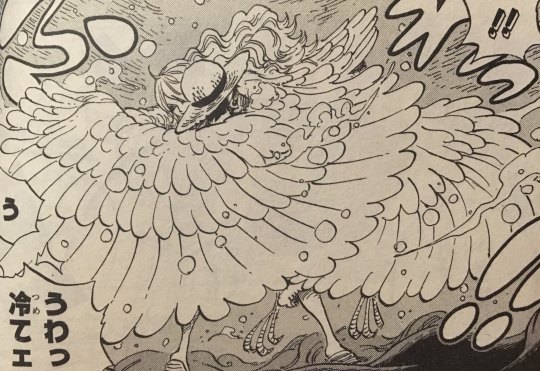

smoker and tashigi get a downgrade in prominence post-timeskip, mostly because the introduction of armament haki means smoker just can’t be the threat he used to be anymore, and i have particular problems with tashigi’s treatment in this arc that i’ve written about before, but- all that said, smoker is still really, really good character in punk hazard, especially in his interactions with vergo and law.
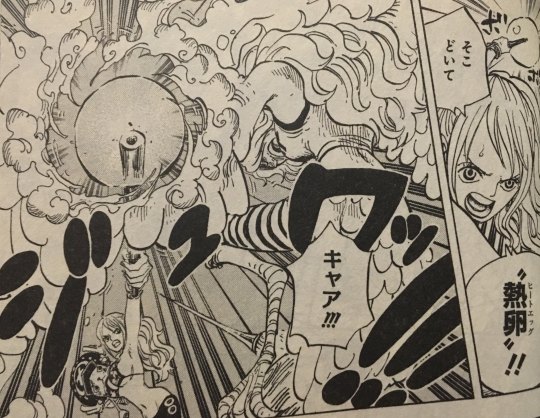
i really love when little, forgettable details come up in ways you might not expect- of course nami’s heat ball hard counters monet’s powers, at least momentarily. she’s made of snow. oda is really incredible of keeping track of little things like this.
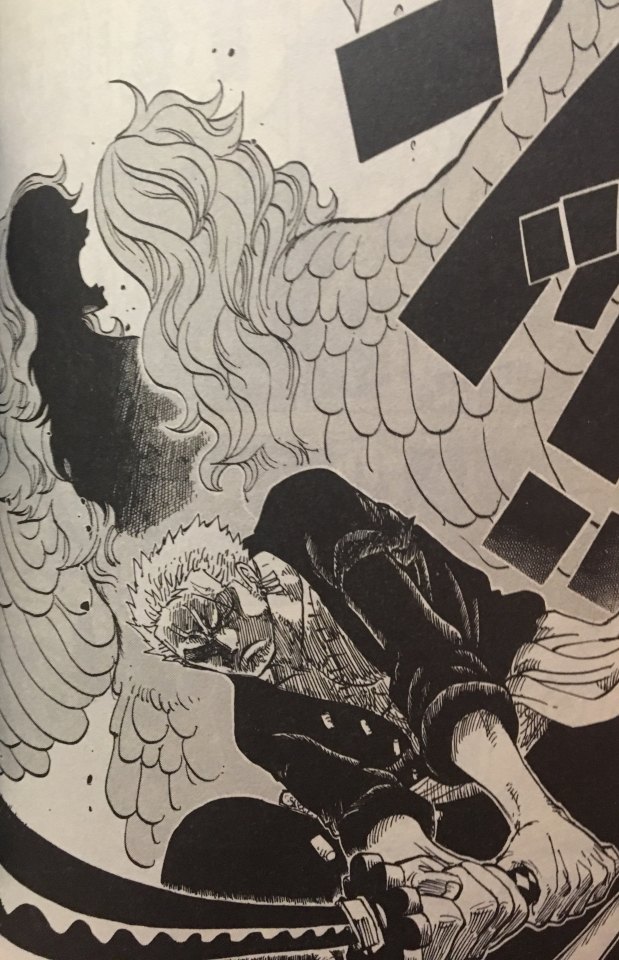
i may have issues with the monet fight but god if this isn’t sexy as hell

of the strawhats, i think chopper is actually one of the ones who shines the most in punk hazard. chopper has some of his best moments when faced with so-called ‘doctors’ who use science to hurt and dehumanize others, directly spitting on everything chopper values and believes in and everything hiriluk died for. he’s really good in thriller bark for the same reason.
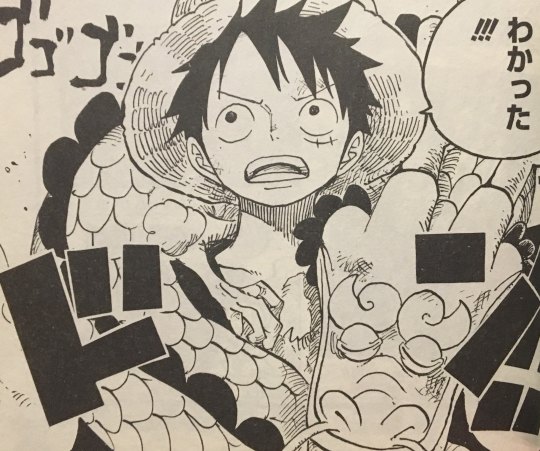
this is one of my very favorite luffy panels.
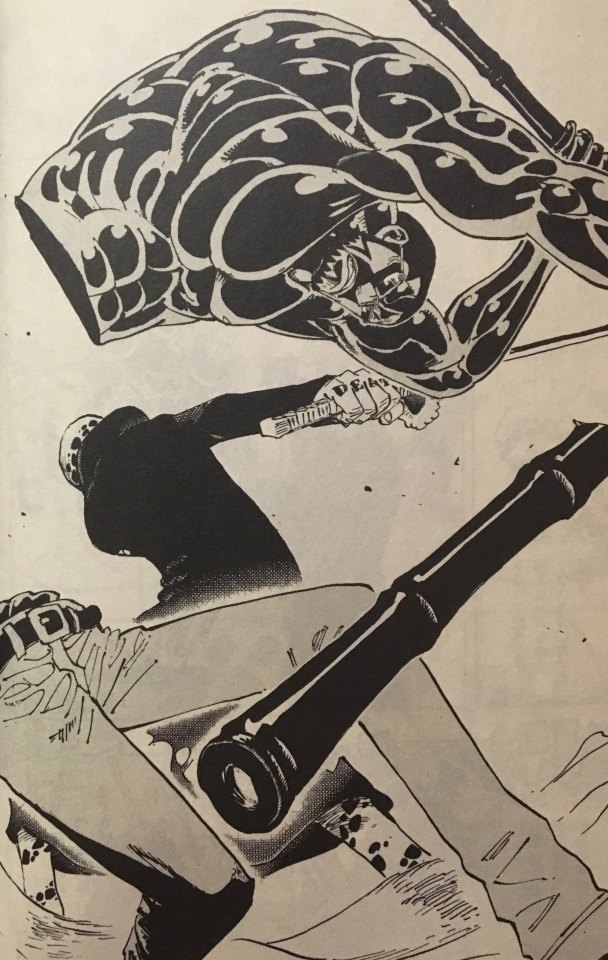
law defeating (and ultimately killing) vergo is highly satisfying just on a first read with only context from this arc, given vergo’s earlier torture of law and his betrayal of the g-5 men’s trust in him, but it takes on an entire new dimension with the knowledge of law’s backstory and just what vergo did to him and cora.
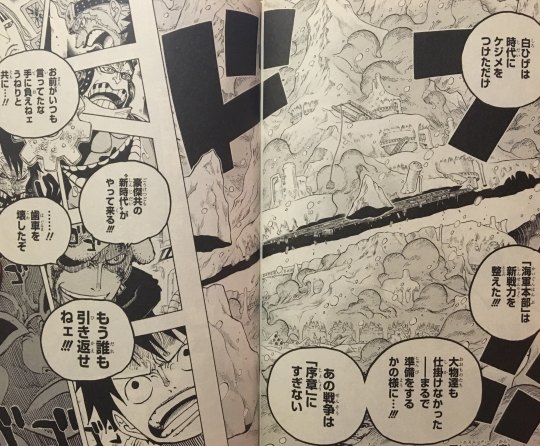
fishman island might be the first major arc after the timeskip, but punk hazard, specifically law’s new era speech at the end of it, strike me as much more emblematic and a much better introduction of what the entire post-ts era of the story is about. it’s not just about survival anymore- it’s about directly, proactively confronting the old, entrenched systems of power that rule the world and then tearing them down to make room for a new world and a new age.


i’ve written... a lot of meta about the donquixote family, their strange, abusive cultishness and the obsessive love and loyalty they hold for doflamingo and how he doesn’t value them in nearly the same way, but this panel in particular is one that sticks with me.
i think this is the only time anyone other than luffy is described as “the man who will become the pirate king” (海賊王になる男/kaizoku-ou ni naru otoko). monet is ready to die for doflamingo, and this is her last thought. it ties very effectively into the twisted parallels between the donquixote pirates and the strawhats.
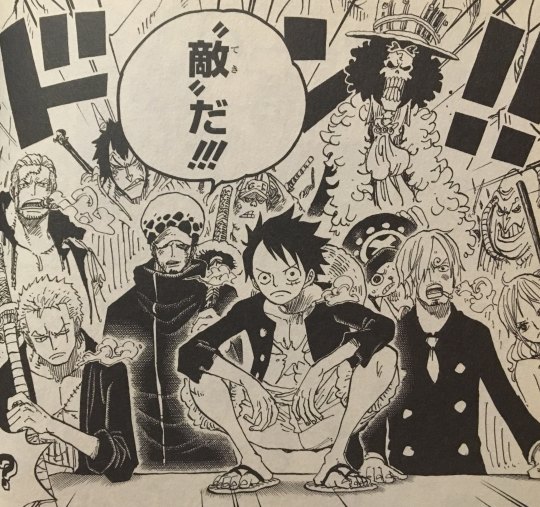
it might be obvious by now, but i’m a huge sucker for group shots

i couldn’t find a good place to mention it earlier, but i really love how kin’emon and momonosuke are introduced in this arc. they’re introduced as fairly inconsequential characters with no real indication that they’ll be anywhere near as important as they will be in the future.
and yet at the same time, there are a lot of details from this arc that make a lot more sense having read wano- momo’s fear of heights, kin’emon’s dislike of dragons, momo’s unwillingness to eat food given to him that hasn’t been taste-tested (definitely something he learned as a shogun’s son, and also probably what saved him from suffering the same fate as the other kids). oda is on a storytelling level i can’t even conceive.

doflamingo has already been pretty thoroughly established as a very dangerous person ever since his introduction back in jaya, but his absolutely destroying smoker and nearly killing him just for not telling him what wants to know really drives the point home, just in time for him to come to the fore as main antagonist of the next arc.


153 notes
·
View notes
Text
A Brief History of Surprise
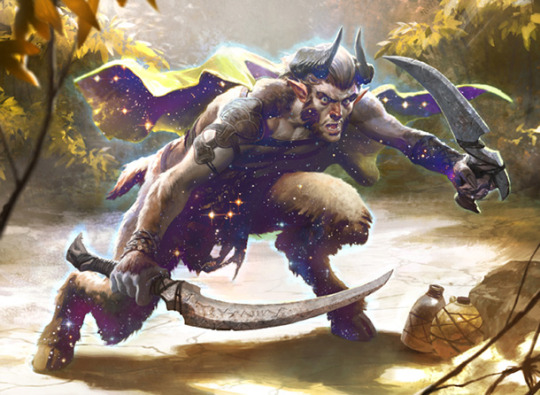
I feel that with this first round of submissions, I’m seeing a lot of “complexity for complexity’s sake,” a lot of “what ifs” that rely on clever appearances taking precedent over elegant design. With that in mind, I thought I’d do a little bit of a personal essay on what I found surprising over Magic’s history. I hope that you will learn a little more about what I’m after and maybe relate to some of it yourselves.
So, what surprised me?
Incremental Rewards
My first block ever was the Alara block, and I’ll always have some nostalgia for it, despite the weirdness. Following that, though, was Zendikar. Zendikar was a fast, aggressive set, and yet there were payoffs that I found amazing once you got there. Sadistic Sacrament was pretty mediocre on its own, but once I ramped up to ten mana, I could selectively mill my opponent and they would know exactly what I had taken out. Hopelessness! Fantastic! And then I saw my first brand-new build-around-me card: Archmage’s Ascension. You could build up over time, over specific cards, with specific strategies, and then control to your heart’s content. Tutoring every turn! What power! And all you had to do was work for it.
Following this, I will say that the Eldrazi surprised me too. Big creatures with massive rewards, sure, they were...something. But there was something off about them, something that I still find strange. I think that their god-like card value was too much for me to handle. I didn’t focus on playing them — I focused on how to beat them. And that wasn’t fun. I was scared. Keyword soup has its time and place, but ability soup has to be balanced.
That New Recursion
The Return to Ravnica prerelease was the first one I had ever been to. Scavenge, Overload, Unleash, Detain and Populate were all fantastic mechanics, and then came along Gatecrash. The fact is, Extort remains my favorite out of all of them to play, but I keep coming back to Cipher. What a messed-up and amazing flavor, complex and strange, nuanced and difficult. Hitting with a creature and creating spells every turn was hard to pull off, but the design remains one of my favorites, and I don’t know why.
I wish they had brought it back for Modern Horizons, honestly. It’s hard to make flavorfully work in every context, because frankly, it almost sounds like sci-fi. And yet it works! It’s shadowy, powerful, strong-get-stronger vibe. And even though it wasn’t really popular, well, I still loved it. I wanted to give other spells Cipher. I wanted to see more than what was there. I wanted to unlock its secrets.
Just my Type
I groked Bestow. Theros as a whole was the set I played the most socially for a good long time. I didn’t like every aspect, but I think that Bestow was the mechanic I was least expecting. Enchantment creatures made sense, no different than artifact creatures. But now, we had creatures that could become auras, creatures that targeted upon casting, beings that engulfed other beings in light and stars and the power of Nyx!
Bestow was the first mechanic I knew I couldn’t have come up with by any stretch of the imagination, not on my own. I had been making custom cards since high school, and this was early in my college career. I was bowled over, blown away, enthralled — enchanted, if you will. I still enjoy Theros limited. It’s no Innistrad, but it’s fun, a swing between battlecruising, aggressive strategizing, and the occasional God.
Speaking of, the Gods surprised me as well. I loved these things. Their lack of creature-dom, the ability to become real and then swing in with cackling precision, was just what I loved about powerful cards those days. You had to work for them. They didn’t just do things on their own. I liked Magic the most when you had to figure it out. Maybe that’s why I’m liking Party so much in this new set.
Coming Together
You know, looking back on my Magic history and personal journey, I find myself pleasantly surprised by two specific mechanics: Party and Historic. These aren’t mechanics per se like Cipher or Bestow, but the batching made sense in a flavorful way that changed the way I build decks in limited. I searched for specific aspects, played my cards to maximize the benefit of playing other cards, and had to make something cohesive that rewarded me for playing right. That’s really all you want out of a game.
I had a blast playing with ZNR and DOM in the drafts that I was able to do, even if I didn’t do the best compared to other players. Utilizing complex mechanics made me feel good even when I wasn’t the best at them. That’s what surprised me the most, considering my lukewarm reception to the cards at first. I underestimated how much I’d enjoy playing with them because I underestimated myself.

Okay, now I’m going to run down a list of surprising cards to me and why I love them. Most of these cards I was surprised upon seeing them, and many played well as well. Let’s get specific.
Mirror-Sigil Sergeant: I get to play my favorite color AND get hella rhinos out of it? Double double, baby!
Thraximundar: I think this is still one of my favorite legends. I want to know everything about him. That name, that flavor... Oh, and a decent card, I suppose.
Ransack the Lab: This is exactly what black should be doing! Great card, you love to see it and play it.
As Foretold: Holy crap, this card. I love it so much. Combo exploitable, free spell increments, great name, great art. I had to reread it so many times.
Vorapede: I always love my Baneslayers, but I pulled this card blind, and the aggression was more than I was used to.
Elbrus, the Binding Blade: Another blind Dark Ascension card! This was the kind of reward I loved working up to.
Gauntlets of Light: I wanted this card and I got this card. Toughness aggro is a beast to beat.
Klothys, God of Destiny: This card surprised me because I hadn’t expected a multicolored God. But she fit well, she played GREAT, and I love her.
Shaman of the Great Hunt: Repeatable multicolored draw? Jesus, what a beast. I felt my stomach turn when this thing hit the table.
Bestial Menace: Oh, an old favorite. Animal summoning never felt so good. I wanted them all to be friends.
Avacyn, Angel of Hope: So simple, so powerful, and she did exactly what she said on the tin. Feels good every time.
The Adventure mechanic: Never before seen, impossible to conceive, staggeringly surprising, and it played great.
Ugin, the Spirit Dragon: Powerful, yes, but the flavor? Ghostfire, plus removal, and then the inverse of his brother Nicol Bolas. Could not have been better.

Should you play to my favorites? Well, obviously not. Should you push the envelope? Don’t push it off a cliff; it’s not a paper airplane. Should you think about your past and consider how the designers of Magic created your own favorite cards that made you gasp and squeal and swear?
YES. Yes! That’s the whole point of this contest! Delve into yourself! Make something that you love! Do something that’s new and yours but is rooted in the real! You’re not here to show off the possibilities of your custom card maker, you’re here to make something you love! If you don’t love it, start over. If you love it for the wrong reasons, start over. Magic should be for everyone. That’s the thing about all those cards and mechanics and ramblings above there: those are the reasons I love those cards. A thousand other players can love them for a thousand other reasons. Empathize beyond.
We are a community. Never forget that.
@abelzumi
16 notes
·
View notes
Note
2, 3, 6, 11, 16, 20, and 25 for the meta writer's ask!
Hellooooo and thanks Bec!! I hope you’ve been doing well! 💖💖💖
From this ask game!
2. Tell us about what you’re most looking forward to writing – in your current project, or a future project
Saying it changes moment to moment sounds like such a cop out answer, but with DoJ it’s very very true 😂 I have so much planned in this story that brain kinda hops around like “Oh man I can’t wait for the League to come up again! oh when is Angora coming back?? How much longer until Kiribaku has their relevant part in the story? When am I finally introducing the big bad???” There’s a lot stuff to look forward to and I think it’s part of why I’ve kept on trucking with this fic as long as I have!
On a different front, I’ve been in a big Bakugou kick for some reason??? I started writing up a thing for that and I’m really excited. It’s supposed to be focused on how they got together in the DoJ universe and I’ve been swapping between that and chapter 24 the last week or so lol
3. What is that one scene that you’ve always wanted to write but can’t be arsed to write all of the set-up and context it would need? (consider this permission to write it and/or share it anyway)
Oh gosh hmmmmm...in Repairs and Connections, I had this idea of how Ochako wants to meet Deku the Handyman again. She really wants to meet and talk with him but like. There’s no reason to call him for a job because nothing’s broken, and the only place she knows where to meet him otherwise is the apartment’s laundry room. And she doesn’t wanna be a creepy stalker about it.
There’s only one clear solution: she marches up to Bakugou and offers the Bakusquad have one of his parties at hers and Tsuyu's place. Because something always gets trashed at their parties and presumably they always call Deku over the following morning to fix it.
But alas, tragically for Ochako, Bakugou, like, figures it out when he messages her for her address. Cause he sees it, and he's like "Oh that's Deku's apartment building.” He messages Deku saying, "Change in plans we're gonna be here for the party.” And Deku recognizes the room number and is like "Oh, Uraraka's place?” And Bakugou is just

He doesn’t say anything to Deku about it, but he messages her like “you ain’t fuckin slick Round Face.” But Bakugou’s also a possessive friend and he has this idea of “alright well if this is what she wants, she’s gotta earn it.” And makes it a point to ensure that she gets fucking hammered during the party, so that when Deku comes over the next morning she’ll be just. Super hung over.
But it’s okay because he maybe spends more time worried about her than the apartment lol
6. What character do you have the most fun writing?
It’s a tricky question because, to be honest, I adore swapping between characters. Variety is the spice of life, it’s true. But honestly writing for Bakugou is always so so fun. I don’t write for him enough compared to how much I actually enjoy doing it lol. I’ll write something and have to just have like reread it to bask in how fun the section with him is
That makes me sound full of myself but it’s true!
11. What do you envy in other writers?
As of right now, I have to say speed. When I see people putting out content like every week or heaven forbid every few days, I die a little inside because I wish I could be so quick. Do you know how far DoJ might be rn if I were faster? Do you???
Actual writing writing though I’m not very good with symbolism. I tend to do things at face value so I envy when people can pull that shit off lol
16. Tried anything new with your writing lately? (style, POV, genre, fandom?)
I wrote from Kirishima’s POV for my latest one-shot! If we don’t want to count that, the next most recent would probably be chapter 22 which had my first attempt at high stakes action. I was actually surprised how much I enjoyed it despite worrying about it for like. Ever lmao
20. Tell us the meta about your writing that you really want to ramble to people about (symbolism you’ve included, character or relationship development that you love, hidden references, callbacks or clues for future scenes?)
So this is a huge easter egg because it’s super tiny and insignificant in the fic, easily forgettable. But I actually already had the major bad guy of my story show up?? He doesn’t get any spoken dialogue or anything though. Just a description that I thought “oh hey I could make it this dude that’d be funny.” But no one will know but me until he’s revealed as the villain. Unless you’re my little sister. She already knows lmao
25. What part of writing is the most fun?
Everything...? I think the fun of writing is just. Creating these feelings and experiences and something memorable through words alone. Like, have you ever thought about that? How wild it is to put a whole bunch of words together and it’s something meaningful to you yeah of course! It’s made from your brain and usually that means you’re bound to enjoy it. But when those feelings can hit and impact other people? Man that’s crazy to think about. Our (the writer’s feelings) affect their (the reader’s) feelings and sometimes they’re the same, sometimes they’re different but it’s still just as interesting!! 😊😊😊
1 note
·
View note
Text
november reading
so with lockdown #2, my master’s thesis done & handed in etc, i just had absolutely nothing going on so this month so... lots of books. featuring Houses full of statues and birds, an AU of weimar berlin, and... the plague?
someone who will love you in all your damaged glory, raphael bob-waksberg (audio) actually listened to this last month! anyway even tho i forgot about it, i actually really liked it! it’s a collection of short stories, all about love in some way, most with a strange twist - a couple wants a small wedding but the MIL insists they have to at least sacrifice 5 goats to the stone god and have a shrieking chorus, or it’s hardly a real wedding, right? that kind of thing. i really liked these stories; they were fun, hopeful without being cheesy (mostly), and the audio production, with lots of actors reading the different stories was fun. 4/5
the driver’s seat, muriel spark man this novella is nasty, but in a good way - sharp, vicious, mean but so well executed. it’s also pretty hard to discuss without spoiling it & i do think one should go into this unspoiled. but it’s certainly a classic of the unhinged women genre, showing lise seemingly making herself as noticeable, irritating and off-putting as she can on a trip to an unnamed (probably italian) city. 3.5/5
the empress of salt and fortune, nghi vo (singing hills cycle #1) a lovely novella set in an asian-inspired fantasy empire, which shows young cleric chih and their speaking hoopoe almost brilliant learn the story of a previous empress, a northerner who rose from exile as an cast-aside wife to power and of her servant, a peasant girl called rabbit. enjoyed the setting and the way this story unfolded through objects and rabbit’s retelling, and will definitely read the sequel novella which comes out in december. 3.5/5
pine, francine toon (audio) this is a crime/thriller type book with some horror elements about a young girl whose mother has disappeared mysteriously when she was very small. she lives with her dad in the scottish highlands close to a giant forest. the beginning is pretty cool & creepy, but then like 80% of it is just the girl being sad & wanting to know what happened to her mother & the dad being an alcoholic mess. and then most of the plot happens in the last 10% & isn’t great. disappointing. 2/5
where the wild ladies are, aoko matsuda (tr. from japanese by polly barton) a collection of short stories retelling japanese folklore stories about female ghosts/monsters with a feminist twist. on the whole, i liked these stories, but also found them a lot more light in tone than i expected; i guess i thought this would be more on the wild & raw side, so i ended up finding them a bit underwhelming. might also be a problem with lacking cultural context. will say tho that tilted axis press is great & i will seek out more of their books. 2.5/5
piranesi, susanna clarke (audio) god this was so good! so delightful! the House with its many rooms full of tides and clouds and birds and statues is a wonderful, magical yet melancholy setting, the narrator is kind & gentle & earnest, full of wonder and curiosity at the House and its mysteries (the contrast between the narrator’s and the Other’s attitude to the House... yes), the slow building up to the numerous reveals are just. very well done. the writing is lovely (did i almost cry about the albatross? yes) and chiwetel ejiofor is a great audio narrator. just all around lovely & the ending hits just right. 4.5/5
doomsday book, connie willis reading this book during lockdown #2.... a galaxy brain move i wouldn’t necessarily recommend. anyway this is set in a near future where time travel is used for historical research; oxford university is sending the young historian kivrin on the first mission to the middle ages (1320, which is perfectly safe, as far as medieval years go), but things go wrong and soon modern day oxford is under quarantine (ha. how wild. can you imagine.) and kivrin notices that some things are a bit off about where she is (spoiler it’s actually 1348 and y’all know what that means right... PLAGUE TIME). lots of people on goodreads found this slow and boring and while it is pretty damn slow (and for a world with time travel way too many plot points hinge on being unable to contact people by telephone), i found it riveting and uh dread-inducing throughout, but also really warm and immersive. adored this, was devastated at the end. even almost a month later i’m still in my feelings about it. 4.5/5
too loud a solitude, bohumil hrabal (tr. from czech by michael henry heim) a novella i intellectually appreciated but didn’t really love - the narrator works as a paper compactor in a nightmarish basement full of mice (that also get crushed by the hundreds) from where he imagines rat wars in the sewers but from where he also saves hundreds of books. it’s fascinating & well-written but as soon as it gets away from the nightmare paper-crushing basement, it just loses its appeal, especially when the narrator reminisces about his relationships to women (how to simultaneously put women on a pedestal and smear shit on them!!!). 3/5
i’m thinking of ending things, iain reid literary horror/thriller type book with a really intriguing first half, as a young woman is visiting her boyfriend’s parents for the first time while thinking of ending the relationship and things increasingly feel off (the parents are weird, there’s a picture on the wall that the boyfriend claims is him as a child, but is actually her, she gets weird voicemails from her own number). great sense of vague unease, very scary. then the second half kind of blows up the whole story in a way that i should theoretically find interesting but just found kind of underwhelming and not scary, especially since the ending then feels the need to spell it all out for you. 2/5
passing, nella larsen (reread) ugh this is brilliant and i almost don’t have anything to say about it so i’ll just summarise it i guess. it’s a novella about two black women in 1920s america, who knew each other as teenagers and who run into each other in a rooftop bar, where both of them are passing as white. irene finds out that clare is passing full-time, married to a white man who does not know that she is black, and although she strongly disapproves, she can’t help but be seduced (the queer subtext is strong here) into renewing their friendship, which begins to threaten her sense of stability and control. this book is pretty much pitch-perfect, has a lot of things to say about race, loyalty, what happens when categories we live by are threatened or destabilised, and is also just tight and elegantly written and. ugh. brilliant. 5/5
ring shout, p. djèlí clark an alternative history/fantasy book where the ku klux klan gets possessed by demons from another dimension and a group of black (and other marginalised) women (some men too) who are able to see these demons have to fight them from gaining more power through a showing of birth of a nation. note: the klan is still already evil without the demons, but their evil makes it easier for the demons to possess them. very cool concept, very cool setting, but i found the main character and some of the plot progression a little boring. 3/5
amberlough, lara elena donnelly (amberlough dossier #1) this is really just the nazi takeover of weimar berlin in an alternate world (literally... the denizens of the city of amberlough are amberlinians... the two epigraphs are from le carre and cabaret...), told thru an amberlinian spy (cyril) forced to work for the nazi-equivalent (the ospies), his secret cabaret mc/smuggling kingpin boyfriend (aristide), and rough-and-tumble sally bowles (cordelia). as such, it’s extremely my shit, although i will say that donnelly makes it a bit easy on herself by making the nazi parallel so very overt; the ospies’ ideology is not particularly detailed beyond ‘real fashy’ and wanting to unite four loosely federated states. it’s just.... a bit weaksauce, and while she does include an ethnic minority for the ospies to hate, this also doesn’t feel as fundamental to their ideology as it should. also cyril sucks. but these issues may be solved in the sequels & it was a lot of fun. also.... amazing cover. 3/5
the vanishing half, brit bennett very much in conversation with larsen’s passing, this is a 2020 historical novel about passing, colorism, and identity, in which desiree and stella, very light-skinned african american twins who grow up in a black town that values lightness very much, become separated when stella chooses to pass for white and marry a white man. the book is very immersive and engaging, and stella and desiree are interesting characters, but (i felt unfortunately) much of the book is focused on their daughters, whose chance meeting might expose stella/reunite the sisters/etc etc, but who weren’t as interesting. the plot also relies on coincidences a lot which is a bit annoying. still an interesting and entertaining read. 3/5
die stadt der anderen, anthology printed version of an art project where three pairs of authors were sent on trips through berlin, which each person writing about what the other person showed them and how they experienced the city through the other. there was nothing earth-shaking in this, but reading it during lockdown was lovely. in conclusion i love berlin... would love to experience it again some time. 3/5
the fire this time, edited by jesmyn ward collection of essays on anti-black racism in america, many in response to the beginning of the black lives matter movement. i don’t have much to say about it, but it is very good and i would recommend. as is often the case with essay anthologies about serious topics i don’t really think i can rate it.
intimations, zadie smith a very short collection of essays written during early lockdown. smith is always smart and fun but i wish these had been a little more focused on politics and less on personal experience, but like, you can’t really criticise a book for not being what you wanted it to be. ‘contempt as a virus’ was very good.
superior: the return of race science, angela saini really solid, engaging and accessible discussion of race science and why... it’s bad & dangerous, both looking at race science in the past and the invention of race, and how it is returning and regaining influence (not to say that race science ever completely disappeared, but as saini explains, it moved into a more marginal space in the sciences after ww2). 3.5/5
the hive, camilo josé cela (tr. from spanish by j.m. cohen & arturo barea) spanish modern classic set in madrid during the last few years of ww2. told thru short fragmentary snippets with a huge rotating cast of characters, mostly lower and middle class, going about their days, with the theme tying them together being “the city, that tomb, that greased pole, that hive”, which is a very sexy line, but unfortunately it didn’t work for me. the tone is v dispassionate and in combination with the huge cast it just made me profoundly unengaged. it also has the weird habit of changing scene in the middle of a paragraph, which i found rather confusing. 2.5/5 slave old man, patrick chamoiseau (tr. from french by linda coverdale) absolutely amazing short novel from the creolité movement aabout an old slave, seemingly resigned to his position, suddenly escaping and being pursued by the slavemaster’s terrifying monstrous mastiff through the forests of martinique, but really also about selfhood, relearning humanity, trauma and nature. the language is at turns sparse and lush and always gorgeous and the translation from french/creole uses endnotes (we love an endnote) and a strategy of doubling to retain some of the original language, which was really cool to read. so yeah this is brilliant. 4/5
mexican gothic, silvia moreno-garcia gothic horror novel about young mexican socialite noem�� visiting her recently-married cousin in her new (english) family’s isolated, creepy and dilapidated mansion after said cousin sent a disturbing and strange letter calling for help. gothic horror shenanigans involving vivid dreams, family secrets and eugenics ensue. after a slow start, i absolutely devoured the second half in one afternoon bc once it gets going it REALLY gets going. not super-scary, but a nice creepy atmosphere & reveal. also loved how it combines the clear yellow wallpaper inspo (the cousin’s letter involves people in the wallpaper) and the focus on the english family’s eugenic ideology (not a fun fact but charlotte perkins gilman was a eugenicist), and the vain & flighty but also smart & stubborn protagonist. had a lot of fun with this. 3.5/5
i’m also still reading a tale of love and darkness by amos oz which is really good but which is taking me forfuckingever.
0 notes
Text
GETTING YOUR STORY ACROSS (MARKETING AND BRAND AWARENESS)
It doesn’t matter if you’re the CEO of a design studio, a student at the Academy or working retail by day and creating art by night — a day only has 24 hours. If then you want to make something out of your life, time management is imperative.
While all of the people who work a 9-5 job have time management enforced into their lives by their workplace, those of us who are self employed don’t have a boss to tell us when to work and when to have our lunch break. And with no HR person breathing down our neck and telling us what to do and when to do it, we have to do this ourselves.
From calculating taxes, checking contracts, planning meetings to learning about our craft and following some sort of news platform so we actually know what’s happening in our field. Oh, and making art, right?! Sometimes freedom can be quite constraining.
But where in this incredibly dense equation of the-things-we-should-be-doing and having-no-time-to-do-them should we squeeze in the most important job of all — marketing?
Not as cool as being a bohemian artist, not as rewarding as making a sale or signing a new licensing deal but probably much more important than everything else mentioned, marketing our work is the only functional way to propagate our ideas into the world.
And today’s world is already quite full — full of people like us, doing things that are similar to ours — so saying we need to have a strong game would be an understatement.
But while many of us think we need to be creating Hollywood-like movies about what we do or making some blown-up statements on how our work will “change the world as we know it”, it really could and should be much simpler:
Make your art simple to understand by making your process transparent.
Not by showing boring two hour videos of us mixing paints and priming our canvases, but by maybe sitting down in-between the drying coats of paint and speaking about our work. We should be documenting our process — not by defending our right to have one, but by explaining our motivations with simple language and a good story.
Give those who are interested in your work a glimpse into your mind and your process. Document how you clean your brushes (or how you never do), why you use a certain brand or type of canvas (even if it’s because it’s the cheapest — sincerity is gold) or show pictures and write about the books you like to read.
There is always time for a short piece of content.
When you don’t have time to set-up a video camera; why not take out your phone and make a short handheld IGTV video or Facebook video or even a story on any topic that you like — connected with your art or maybe even just about what makes you tick. Lots of content on the platforms you feel comfortable with is the best way to go if you can’t afford to run ads on Facebook or Instagram.
Your work, life or personality aren’t boring, and they surely aren’t unimportant!
Some people religiously reread a few books that are special to them every year (something I could never do), and the intentions and the drive behind doing so are actually fascinating to people like me, who after finishing a book usually toss it away and find another one to read.
My point is; even the minuscule things that we do in our lives can be immensely interesting to some people and in reality, usually exactly these minuscule parts of our personalities give others the ability to connect with us on a personal level.
You don’t become best buddies with someone just because they like art as much as you do, because liking art is too broad of a subject to be relatable. You get close because of having or liking the same kind of artists and their works and only if both of you understand them in approximately the same way.
To get there, both need to first share their personal aspirations towards a certain topic, and be sincere about it. Otherwise it’s like opening your Facebook news feed and looking at vaguely interesting ads about pant tubes — you kinda like them, but just couldn’t care less about them being there.
In the end, we shouldn’t just be painting pictures on canvases and Fabriano paper, we should be painting mental images onto the minds of our followers and soon-to-be-followers. Only so can we ever succeed in expanding our reach to the people who really care and genuinely like our work.
CREATING ATTENTION
Art is obviously emotional and as such its value is determined absolutely subjectively. The big question though is how, because even though ambivalent, subjectivity can still give us a lot of various starting points to think about our target audience.
How people recognise a good story in objects and experiences differs from person to person — that’s why it’s subjective — but usually we can find basic guidelines that can help us define this perception. The main idea behind this exercise is to find what is most important for each person, that we are trying to understand.
What are their needs? What do they wish for? Do these wishes and needs have a certain urgency? Do they provide pain or discomfort for them and can our art elevate or even completely fix their issues?
Even though art is seen as the complete opposite of utilitarian — especially is we look at contemporary art — it could not be further from the truth. If nothing else, the baseline of what art can do is to catch attention. To intrigue and incite curiosity about itself in those that experience it.
Art has to be interesting. It can be either “avant-garde” or challenging, but at the same time it can be personal and quaint; there is no “standard” that defines what interesting is, except that whatever it is we are creating should stand out in the context of everything around it.
An apple on the ground of an orchard is about as interesting as a grain of sand on a beach, but that very apple, placed in a vineyard will catch people’s attention, because they ordinarily wouldn’t have expected it to be there. The same goes for art; anything we do should aim to be exceptional, compared to the environment it resides in.
But this doesn’t mean that we need to run naked in the streets while reciting the Yellowist manifesto, because there are much more subtle ways to stand out, and truly great art is always made in a subtle, but disruptive way. Think about all the one hit wonders in the music industry — they might have been successful with one song, but after the initial boom, they slowly fade into the background.
Their problem is, that they have been trying to impress and communicate to the kind of people that need constant novelty and excitement to give them their attention. And because they focused on people that needed cheap thrills, they themselves become one in the end.
Only those that build their novelty and intrigue with a long timeline in mind and cultivate the attention of the people as a friend or acquaintance, not a passing circus or magician, are able to find true success with their creative business.
Because, while a magician may be able to entice and amuse us for a few hours, after we’ve seen the show, there’s really no point in going back another time. We’ve seen all of her tricks, laughed at all of the jokes and it just wouldn’t have the same novel effect on us as it did the first time.
But comparing it to our favourite book, that we have reread a thousand times, or our favourite TV show, that we know by heart and still binge watch from time to time, these objects and experiences never seem to really get dull.
Quite the opposite, they get better and better over time.
QUALITY AND QUANTITY
A lot of people today speak of quantity as the defining factor in getting your message into the world — with Gary Vaynerchuk being at the forefront of this movement.
But I think we do need to take a closer look at this model.
I still think quantity plays an enormous role in content production — especially as the amount of blog posts, podcasts and images on the web is increasing exponentially — but there is one important truth that many of us may overlook in this conquest of trying to reach the eyes and ears of the masses.
Quality is king and quantity is his servant.
I get why the amount of information is being pushed as the most important factor; too many of us focus endlessly on tweaking and re-editing our content, too many of us spend hours making our images, texts and videos “perfect” and thus miss a lot of opportunities of growth and consequently reach.
The 80/20 rule still applies to everything in the universe; 80% of effect is produced by 20% of our effort. Of course, we shouldn’t confuse this with the idea that we only have to do 20% of the work and get 80% of the rewards.
We still need to do all of the work. And regardless of how much “all of the work” actually is — 5 min or 5 years of input, it doesn’t really matter — the effect is always more or less the same; most of what we do will not bear any fruits, but a fraction will. And that fraction will create the most effect.
Here the real argument for quality begins to take shape; if 100% of what I did was only average or “merely” good, the effects of it will embody the same kind of qualitative force. Good things lead to good results, average work produces average products and services, but excellence, excellence can’t but create exceptionality.
In order for any one of us to reach excellence, we have to first begin our path with average tools, common techniques and boring (and many times tedious) practice. But after such a rhythm has been established, after the almost masochistic pleasures of repetition and rigorous practice become part of our being, I believe all of us need to again venture further into the unknown.
And this means reevaluating everything we have been doing up to this point. A child may have enormous dependence on his training wheels when learning how to ride his bike, but after they succeed in mastering balance, speed and manoeuvring, the support has to be taken away, exposing the reality that all they have done up to that point was mere practice for the real thing.
In the end, all we do — regardless of whether we write, sing, paint or dance — we do so as a form of diary, a succession of traces that we leave upon the world. It doesn’t matter if our creations ever get exposed to the public; even those of us that never publish our creations and keep our diaries, paintings and songs to ourselves , we inevitably all do the same.
We create marks upon the world, knowingly or not, by accident or in order to be remembered. Regardless though of why we do what we do, I believe one thing is for certain.
Such marks should be born out of the highest efforts that we can endure, if not to grow, at least to know that whatever we did mattered, perhaps to some, or maybe none, but always to ourselves.
from Surviving Art https://ift.tt/2OGteVE via IFTTT
0 notes
Photo
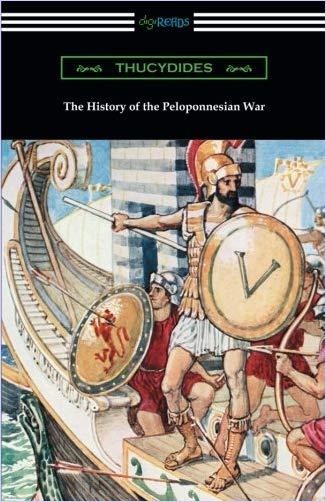
The price is unbeatable but the translation is pretty rough. Many sentences had to be reread to ... The price is unbeatable but the translation is pretty rough. Many sentences had to be reread to just sort out the awkward phraseology. Thucydides is hard to translate because even in his time his writing was criticized for neologisms, very quirky metaphors and abstractions and odd turns of phrase. But this makes it all the more important to have a good translation. This one does used modern terminology that is sometimes jarring in the context of the era of the history, So Thucydides was not an easy read for his contemporaries and thus a "good translation" that reads easily also fails to convey the characteristic of the actual work itself. The translation by Warner perhaps comes as close to palatable and yet conveys the unique style that is Thucydides. As a work, it could be a 21st Century treatise. The parallels to current events are almost eerie from the "neocon" Alcibiades urging Athens to the Iraquian Syracuse war disaster to the oligarchy displacing the Athenian democracy.... the parallels are remarkable. Go to Amazon
Twenty-four hundred years ago, and still feels like to-day This is a difficult book to read and a difficult review to write. Both lie in the book's richness and the fact that many books, not only reviews, have been written about Thucidides' masterpiece. For example, there is an excellent (and most warmly recommended) article in Wikipedia. Can I add anything? Well, it is still worth a valiant try. A word of warning- before you embark on this reading adventure, get yourself a good detailed map of the contemporary Mediterrenean. It would be a great help to understand the various moves and identify the many actors of this 21-year power-play. Go to Amazon
Amazing. The History of the Peloponnesian War by Thucydides is a joy to read because it is so well structured and written, even though it is several thousand years old. Don't mistake this for some antique text that is full of the romantic past, if you changed the people and place names it could have been written last week. The analysis of the political problems that led to this war are so clearly and well reported by the writer that even beyond its historical value is the value of its literary quality. Today's journalists and historians would do well to study this work, if not to improve their own work or to use as an example, but for the sheer pleasure of reading something so well formed and thought out. Go to Amazon
I absolutely loved the style in which the story is told I absolutely loved the style in which the story is told, rather than making everything as brief as possible, Thucydides takes his time, he is as long-winded as they come and that's a good thing. Sometimes a multitude of words are needed to fully explain a situation, sometimes it's even best to look at things from more than 1 perspective, a crazy thought I know. Around the page 400-500 mark it really hit me, this is exactly what we need in the world today. I can only hope that other Greek classics are done in the same style, at the very least this book has me seeking them out. I can even say who fought in, who won, and what the basic sides were in the Peloponnesian War, not something I could have said before I picked up this book Go to Amazon
Quite fascinating but need time to trudge through I once was in the U.S. Army. As part of our job we were always encouraged to study history to see how people thought and wars were executed. No war is ever the same so what we are reading to learn is the why. There is also how people responded to different tactics and strategies. Go to Amazon
Well read. Audible and Kindle editions are Richard Crawley translation. Good book Too slow and complex for me. Three Stars Corrected Unreadable Great read Excellent for a scholar or historian; ok for the general public Five Stars A Classic Translation of a Classic Work Four Stars
0 notes
Text
DETERMINING THE VALUE OF YOUR ART: CREATING ATTENTION
Art is emotional and as such its value is determined absolutely subjectively. The big question though is how, because even though ambivalent, subjectivity can still give us a lot of various starting points to calculate value from.
It’s all about perceived value though — not that the actual value of materials in a work or the hours we spend aren’t important, but the tag word for this topic is perceived. Because let’s face it, unless your art is made out of pure gold, the materials should matter a lot less than the story that’s behind it.
How people recognise a good story (true value is indeed almost only a story) in objects and experiences differs from person to person — that’s why it’s subjective — but usually we can find basic guidelines that can help us define this perception. The main idea behind this exercise is to find what is most important for each person, that we are trying to understand.
What are their needs? What do they wish for? Do these wishes and needs have a certain urgency? Do they provide pain or discomfort for them and can our art elevate or even completely fix their issues?
Even though art is seen as the complete opposite of utilitarian — especially is we look at contemporary art — it could not be further from the truth. If nothing else, the baseline of what art can do is to catch attention. To intrigue and incite curiosity about itself in those that experience it.
But, while this base function isn’t exactly of value, more a prerequisite for anything of value to be present in art, we still need to address it, as going past such an important issue in our artworks makes all further work pretty much useless.
Art has to be interesting. It can be either “avant-garde” or challenging, but at the same time it can be personal and quaint; there is no “standard” that defines what interesting is, except that whatever it is we are creating should stand out in the context of everything around it.
An apple on the ground of an orchard is about as interesting as a grain of sand on a beach, but that very apple, placed in a vineyard will catch people’s attention, because they ordinarily wouldn’t have expected it to be there. The same goes for art; anything we do should aim to be exceptional, compared to the environment it resides in.
But this doesn’t mean that we need to run naked in the streets while reciting the Yellowist manifesto, because there are much more subtle ways to stand out, and truly great art is always made in a subtle, but disruptive way. Think about all the one hit wonders in the music industry — they might have been successful with one song, but after the initial boom, they slowly fade into the background.
Their problem is, that they have been trying to impress and communicate to the kind of people that need constant novelty and excitement to give them their attention. And because they focused on people that needed cheap thrills, they themselves become one in the end.
Only those that build their novelty and intrigue with a long timeline in mind and cultivate the attention of the people as a friend or acquaintance, not a passing circus or magician, are able to find true success with their creative business.
Because, while a magician may be able to entice and amuse us for a few hours, after we’ve seen the show, there’s really no point in going back another time. We’ve seen all of her tricks, laughed at all of the jokes and it just wouldn’t have the same novel effect on us as it did the first time.
But comparing it to our favourite book, that we have reread a thousand times, or our favourite TV show, that we know by heart and still binge watch from time to time, these objects and experiences never seem to really get dull.
Quite the opposite, they get better and better over time.
from Surviving Art http://bit.ly/2wjq6Ve via IFTTT
0 notes